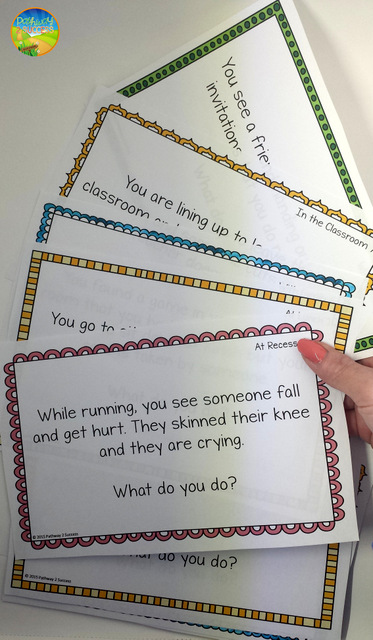
Social problem solving is the process of figuring out how to deal with social situations and challenges. It involves understanding the situation, identifying a problem, considering solutions, and choosing the best way to handle that specific situation. While many kids and young adults figure out how to maneuver through these social challenges on their own, others often needs lots of help. These are the kids who get into arguments with others, can’t deal with disappointments, become upset easily, or have difficulty making (or keeping) friends. The good news is that social problem solving skills can be learned and developed over time.
The best way to learn social problem solving skills is to practice over and over through multiple situations. This allows kids and young adults to go through the process and develop their social thinking skills. Task cards are a great way to practice a variety of scenarios for social problem solving.
Here are some strategies for using task cards for teaching social problem solving:
1. Put together a variety of social situations on task cards. You can make your own with index cards or use a pre-made set, like the Social Scenario Problem Solving Task Cards. Remember to include lots of different situations, such as times with friends, at recess, in the classroom, with family, at lunch, and any other scenarios that may be important for that child. They key is having many different social scenarios that involve dilemmas or challenges, so that kids can think through each problem in a new way.

2. Put the cards on a ring. You can choose to just keep one set for yourself or give sets to partners and groups. Flip through them in a small group, during morning meetings, or during partners and group practice.

3. Give time for group discussions. Kids learn best from other kids! Allow time for lots of talk on each task card. Discuss things like “What would you do?”, “Why would you do that?”, and “What are some other options you could consider?”. Kids and young adults will disagree sometimes, and that’s okay. Allow for kids to explain their thoughts and really think through their social reasoning. This gives opportunity for social and emotional growth while learning from others.

4. Set up cards at centers. Have a center for each different type of scenario. Have kids work through each center in small groups. Then, after a certain amount of time (10 minutes or so), have each group move to the next center. It’s a fun way to practice social problem solving while allowing some movement, too.

5. Remember to include older kids, too! Middle and high school kids can also greatly benefit from learning social problem solving skills. Make sure to tailor the situations to your age group. For older kids, it’s helpful to focus on friends, relationships, online and texting, in classes, and during less structured time like lunch and in the hallways. Older kids will have just as much fun practicing social situation task cards as long as they are age-appropriate.

Get Started!

If you want to get started practicing social problem solving skills with elementary-age kids right away, try using Social Scenario Problem Solving Task Cards for Elementary. The cards are organized into five different sets that target different situations: With friends, with family, in the classroom, at recess, and at lunch.

If you need to practice this skill with older kids, try using Social Scenario Problem Solving Task Cards for Middle and High School. The social situation cards are organized into five different sets specific for older kids. Those situations include: With friends, with family, in classes, in the hallway and cafeteria, and online and texting.







Fantastic idea. I am trying to do one for a child having difficulties with siblings.
Any recoomendations?
Thanks.
wonderful idea,will immensely enhance problem solving skills of young mindsThanks
I’m glad you find these helpful! All kids need improved problem solving skills!